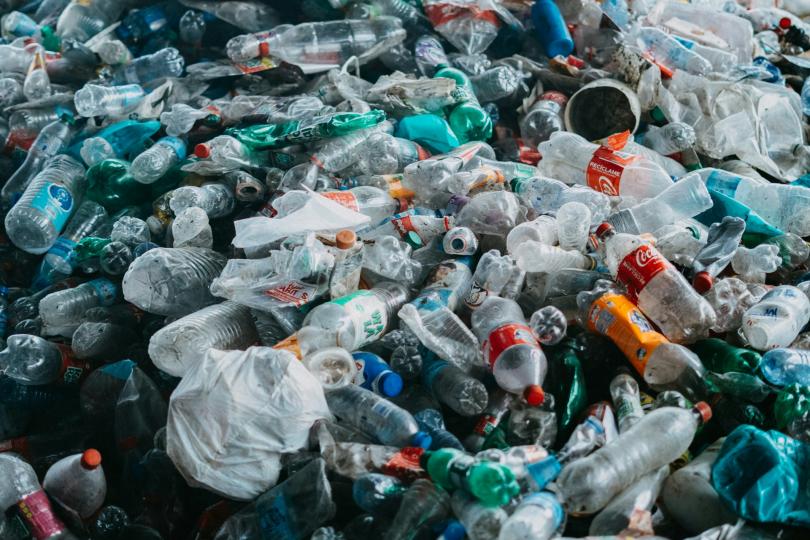Reducing plastic waste at the Switzer Foundation
Written by Sarah Reed, July 2025
The Switzer Foundation aims to align all our programs, governance, and operations with our mission and values. This includes reducing the environmental and social equity impacts of the foundation’s purchases and events. In this story, we share the foundation’s new policy for eliminating single-use plastics in our work.
People living in the United States consume more plastic per capita than any other nation in the world, for lifestyle conveniences such as packaged foods, clothing, and electronics. Plastics are derived from petroleum, and investing in plastics is a key strategy for fossil fuel firms, contributing to increases in global greenhouse gas emissions. Emissions from the plastics industry will exceed contributions of coal-fired power plants by 2030, and plastics and other petrochemicals will become the largest drivers of oil demand by 2050.
In addition to climate impacts, plastics persist in the environment and pollute the earth’s air, land, and waters. Microplastics are tiny plastic particles designed for commercial use, such as for cosmetics or textiles, or that result from the breakdown of larger plastic items. Microplastics degrade slowly and accumulate in ecosystems and organisms–for example, there will soon be more plastic by weight than fish in the world’s oceans.
Plastics also contain hazardous chemical additives, including PFAS “forever” chemicals. Plastic waste causes myriad health issues for people who drink water and consume seafood contaminated with toxic plastics. Plastic production and petrochemical pollution disproportionately impact low-income and BIPOC communities in the United States, and health costs related to endocrine-disrupting chemicals in plastics have reached $250 billion annually.
Negotiations on a global treaty to end plastic pollution have not yet been successful. However, at local and regional levels, well-designed plastic bans have successfully reduced plastic use and associated waste and pollution.
At the Switzer Foundation, we aim to emulate successful local bans by implementing a policy to eliminate single-use plastics in our work and at our events. For foundation-sponsored activities, we will not purchase or use single-use, non-compostable plastic bags, packaging materials, food service items, hot beverage cups, or beverage bottles. We will also work with event venues and vendors to eliminate single-use plastics from food service, packaging, and supplies. The purpose of this policy is to facilitate a transition from single-use plastics to reusable or compostable alternatives, especially materials that are durable and intended for multiple uses.
See below for the references the foundation consulted as we developed our policy to eliminate single-use plastics. Our goal in sharing our policy and resources is to support Switzer Fellows and their organizations who are also seeking to reduce the environmental and justice impacts of their purchasing and contracting decisions. Please feel free to contact us with questions about implementing your own policy.
We know that many Switzer Network members are experts on plastic waste and pollution, and we have already modified the policy based on your feedback. We welcome continued discussion about this and other ways to align the foundation’s programs, governance, and operations with our mission and values.
References:
Bauer and Nielson. 2021. Oil companies are ploughing money into fossil-fuelled plastics production at a record rate. The Conversation. https://theconversation.com/oil-companies-are-ploughing-money-into-fossil-fuelled-plastics-production-at-a-record-rate-new-research-169690
Beyond Plastics. 2021. The new coal: Plastics and climate change. Beyond Plastics. https://www.beyondplastics.org/publications/the-new-coal
Mishra. 2024. Plastic pollution treaty negotiations adjourn in Busan, to resume next year. United Nations. https://news.un.org/en/story/2024/12/1157646
Sokolow et al. 2024. Plastic bag bans work: Well-designed single-use plastic bag bans reduce waste and litter. Environment America. https://environmentamerica.org/center/resources/plastic-bag-bans-work/
Trasande et al. 2024. Chemicals used in plastic materials: An estimate of the attributable disease burden and costs in the United States. Journal of the Endocrine Society. https://academic.oup.com/jes/article/8/2/bvad163/7513992
World Economic Forum, Ellen MacArthur Foundation and McKinsey & Company. 2016. The new plastics economy: Rethinking the future of plastics. https://www.ellenmacarthurfoundation.org/the-new-plastics-economy-rethinking-the-future-of-plastics
Zimmerman. 2024. Plastics pollution - Setbacks and solutions. Public Employees for Environmental Responsibility. https://peer.org/commentary-plastics-pollution-setbacks-solutions/


